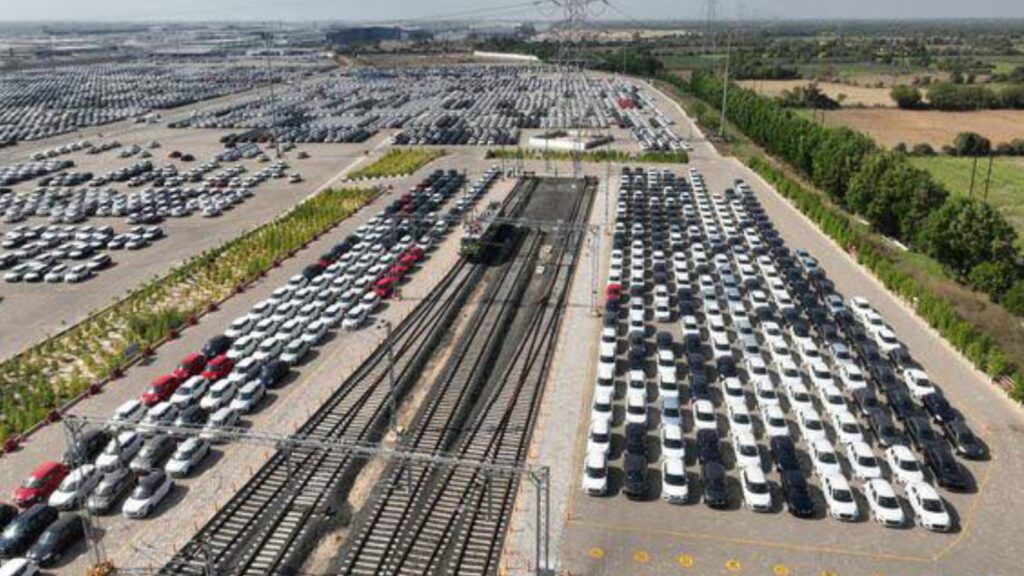
Maruti Suzuki Shifts to Indian Railways For Car Delivery : Eco-Friendly Logistics Strategy for 2030 – In a strong move toward cleaner, more efficient logistics, Maruti Suzuki plans to transport a significant portion of its vehicles using Indian Railways by 2030. The goal is to shift nearly 35% of its total vehicle deliveries away from road-based logistics and onto rail tracks, marking a notable change in how India’s largest carmaker handles nationwide distribution.
This approach is part of Maruti’s broader vision to make its supply chain more eco-friendly, faster, and cost-effective across long distances.
Table of Contents
🚂 Why Maruti Suzuki Shifts to Indian Railways for Car Delivery?
Maruti’s decision to boost the share of vehicles delivered by train stems from several operational and environmental advantages. Moving cars by rail helps reduce carbon emissions, saves fuel, and offers more reliable delivery timelines—especially over vast distances that involve cross-country transportation.
Currently, only about 17% of Maruti’s cars are moved via railway, but the company aims to double that by the end of the decade.
🏭 New Rail Infrastructure in Gujarat to Power the Shift
The company recently opened a dedicated railway siding within its Gujarat plant. This infrastructure enables direct loading of vehicles onto freight trains, cutting out the need for truck transport to external railway stations. The Gujarat plant joins Maruti’s other in-plant siding at Manesar, creating a more integrated and streamlined logistics system.
With this setup, the time taken between production and dealership delivery is expected to reduce significantly.
🌱 Environmental and Business Benefits Combined
Transporting vehicles by train is not only more fuel-efficient—it’s also dramatically less polluting. According to logistics studies, trains emit up to 75% less CO₂ per ton-kilometer compared to trucks. For a high-volume producer like Maruti, this reduction is substantial in annual terms.
- Besides environmental gains, there are business incentives too:
- Fewer trucks mean lower overall transport costs
- Rail deliveries face fewer delays due to road congestion
- Damage to vehicles during transport can be minimized
- Logistics can be scheduled more predictably
🇮🇳 Supporting India’s National Logistics Modernization
The Indian government has been urging industries to adopt rail for goods movement to reduce strain on roads and cut emissions. Maruti’s initiative directly aligns with this vision, showing that large corporations can successfully implement green logistics at scale.
As India’s Dedicated Freight Corridors (DFCs) expand, manufacturers across sectors are expected to increasingly explore rail freight as a viable and smart alternative.
🏭 Production-to-Platform Speed Boost
One key advantage of using trains is the dramatic improvement in production-to-delivery timelines. Vehicles manufactured in Maruti Suzuki’s Haryana and Gujarat plants can now be loaded directly onto customized railway rakes. These rakes are designed to carry up to 300 cars in a single trip, making the process not only faster but also far more reliable. By reducing transit time by almost 30%, Maruti Suzuki is improving inventory management at dealerships and satisfying customers quicker.
🚆 Customized Railway Rakes for Auto Logistics
To support this transition, Maruti Suzuki has partnered with Indian Railways to introduce dedicated automobile freight trains. These aren’t ordinary cargo carriers — they are specially engineered BCACBM rakes, built to handle double-decker loading of vehicles safely. These rakes allow vertical stacking, minimize damage risk, and maintain the integrity of the cars even during long-distance travel. It’s a major investment in infrastructure that signals the brand’s long-term faith in rail logistics.
📉 Environmental Impact and Cost Savings
The “Maruti Suzuki big shift trains to deliver” isn’t just about faster delivery — it’s also a sustainability win. By choosing rail over road, the company is reducing CO₂ emissions by up to 60% per vehicle transported. Not only does this align with India’s net-zero targets, but it also helps Maruti cut down on fuel and toll costs. The green logistics strategy enhances the brand’s image and meets ESG benchmarks crucial for global investor confidence.
🔄 What This Means for the Auto Industry
Maruti Suzuki’s plan sets an example that other automakers are likely to follow. The shift toward railway-based transport helps not just the environment but also the brand’s own logistical flexibility and national reach.
As rail infrastructure becomes more accessible, automakers can cut delivery times and meet demand from far-flung cities with improved accuracy.
🚘 Final Thoughts: A Sustainable Road Ahead—On Rails
By choosing to deliver over one-third of its vehicles through rail by 2030, Maruti Suzuki is not just adjusting its logistics—it is reimagining it entirely. This change reflects the company’s commitment to smarter, greener growth while also boosting efficiency and cost control.
Maruti’s bold step proves that large-scale industrial transport can indeed ride the rails into a more sustainable future.
